Thailand tentatively reopening to tourists but recovery still far off
Also in this edition: The ruling generals are still divided; violence is escalating in nightly clashes at Din Daeng; and royalists are fretting about pornography, cartoons and a Korean TV show
Welcome to the latest Secret Siam news roundup. These regular updates will remain free for everyone for now, but if you find my work useful please subscribe. You will gain access to an extensive archive of exclusive material, and your support will really help my journalism. Secret Siam is an independent newsletter fully funded by readers, so your help really counts. Thank you to everyone who already supports my work.
Several subscribers have told me that my newsletters are frequently ending up in their junk mail folder. This is a particular problem if you are a gmail user. To fix it, please add zenjournalist@substack.com to your contact list, and you can also send me an email at the same address, which should ensure future newsletters don’t go into your junk mail. A full troubleshooting guide is here.
For anyone who missed them, I published two major Secret Siam articles last week, on royal wealth and the massacre of October 6, 1976.
Now onto the latest news…
Another broken promise
In a televised address to the nation on Monday evening, Prayut Chan-ocha announced a partial reopening of Thailand to foreign visitors. But he was strikingly vague about the details and many crucial questions remain unanswered.
Prayut declared that foreign visitors from at least 10 “low-risk” countries would be able to enter Thailand by air from November 1 with no quarantine requirements, as long as they are fully vaccinated and were tested for the coronavirus before leaving their home country and again on arrival.
But he was only able to name five of the countries — the US, China, the UK, Germany and Singapore. Both the US and UK can’t really be considered low-risk countries — they continue to struggle to contain the virus and Britain has seen a surge in infections after England abandoned precautionary measures.
It seems clear that the nations named so far were chosen because of the number of visitors who come to Thailand rather than any sensible scientific assessment of the prevalence of the coronavirus in countries around the world.
We also don’t know if visitors will be able to bring unvaccinated children with them. Meanwhile, Prayut also said alcohol won’t be sold at restaurants and entertainment venues until December 1, bars will remain closed, and the 10 pm curfew remains in place. So tourists are unlikely to come rushing back.
The relentlessly overhyped so-called Phuket Sandbox scheme has shown that most visitors are not thrilled about having to jump through so many hoops and deal with so much bureaucracy. As the BBC’s Jonathan Head has observed, the sandbox scheme was basically just a PR stunt. It did not have any significant positive impact on businesses in Phuket.
It doesn’t help that the regime wants to track tourists using facial recognition software and plans to charge them 500 baht each just for setting foot in the kingdom. The latest tourism marketing slogan — “Visit Thailand 2022, Now Even More Amazing Thailand Has It All” — is unlikely to work wonders either.
“The question is not about reopening or not, but how to reopen and our readiness to cope with it,” said Paopoom Rojanakul of the opposition Pheu Thai Party. “I cannot see where the foreign tourists will come from.”
Prayut’s speech just illustrated the Thai government’s continued lack of any coherent policy. To hammer home his ignorance, he ostentatiously wore a face mask for his televised address, after being fined in April for failing to wear one at a government meeting. But there was no need for him to wear a mask for a television broadcast as long as proper social distancing measures were in place. It was more evidence that he really has no idea what he is doing.
The reason Prayut had to make some kind of announcement is that four months ago on June 16 he pledged to fully reopen Thailand within 120 days. That implied that by October 14, all restrictions should be lifted.
But Prayut made his rash promise before the fearsome fourth wave of the virus — the highly contagious Delta variant — tore through Thailand and exposed the inadequacy of the regime’s vaccine procurement strategy.
Because of his government’s incompetence, Prayut is unable to keep his promise — it’s simply not safe to fully reopen Thailand yet. But he had to say something to save face. So this was the reason for Monday’s announcement. He was just trying to avoid more embarrassment.
The regime’s decision to begin reopening was an acknowledgement that the economy cannot cope with continued lockdown. Thailand is so reliant on foreign visitors to keep hundreds of thousands of small businesses afloat that there is no sensible alternative to taking the calculated risk of starting to open the borders. As Prayut said during his televised speech:
We have to monitor the situation closely and assess how we will cope with the situation, but we cannot allow this opportunity to pass us by because, if we miss this golden moment to generate revenue for the second year in a row, I think the people will not be able to take it any more.
He added:
The time has come for us to ready ourselves to face the coronavirus and live with it as with other endemic infections and diseases, much as we have learnt to live with other diseases with treatments and vaccinations. Today, I would like to announce the first small but important step in decisively beginning the process of trying to restore our livelihoods.
I know this decision comes with some risk. It is almost certain that we will see a temporary rise in serious cases as we relax these restrictions.
The government’s failure to secure a timely supply of vaccine doses until it was already far too late makes even this tentative step potentially highly dangerous. Only a third of Thais are double-vaccinated.
The Rural Doctors Society, which has been a welcome source of accurate information during the pandemic, has warned that the infection rate is much higher than official figures suggest, and probably well over 20,000 new cases per day. They predicted that infections may start to steeply rise again soon, with new clusters “popping up like mushrooms”.
However, deaths appear to be clearly on a downward trend, which suggests that even though the number of new cases has been routinely underestimated, the belated vaccination drive is finally having a significant impact.
Meanwhile, police are going ahead with lèse majesté charges against billionaire democracy movement leader Thanathorn Juangroongruangkit over his valid criticisms of the disastrous decision — now long abandoned — to source the vast majority of vaccine doses from opaque royal company Siam Bioscience. Thanathorn was reported to police by Apiwat Khanthong, executive assistant to Prayut, and the charges relate to a livestreamed video from January. You can read full details about the controversy in my article on the palace and the pandemic published in July.
Thanathorn went to Phahonyothin police station on Tuesday to acknowledge another lèse majesté accusation and get fingerprinted. In a tweet he said the government is pursuing at least 800 prosecutions of political opponents, targeting more than 1,500 people. He added that at least 150 people are facing lèse majesté charges.
Prosecuting Thanathorn is a strategically terrible decision that will ensure the incompetence of the Thai regime’s vaccine strategy gets even more attention all over the world. It will also cause more embarrassment for AstraZeneca, which already bitterly regrets striking the deal with Siam Bioscience, and will scare away other multinational conglomerates from ever going into business with a Thai royal company. The debacle will have long-term consequences for the reputation of Thailand even after the country eventually recovers from the damage caused by the coronavirus.
In his address to the nation, Prayut tried to claim that the recent reduction in infections and deaths was an amazing achievement by his government:
Our nation has performed an extraordinary feat in the last months and we can all be very proud about everyone's enormous contributions…
In fact, the regime’s handling of the pandemic has been a catastrophe, and has devastated the livelihoods of millions of Thais.
General discontent
Relations between Prayut and his mentor Prawit Wongsuwan remain highly strained after the abortive plot to topple the prime minister in a no-confidence vote last month.
Apparently believing that the Palang Pracharat Party would not nominate him as its prime ministerial candidate ahead of the next election, Prayut encouraged the formation of a new party to help him hang on to power. After retiring as permanent secretary at the Ministry of Interior at the end of last month, Chatchai Phromlert, a close ally of Anupong Paochinda who is on Prayut’s side in the battle among the ruling triumvirate, said he would create a new party to support Prayut staying on as prime minister. Suchart Chantarachotikul, chief of Palang Pracharat’s southern strategic team, said he would defect to the new party and bring more than a dozen southern MPs with him.
The news caused more tensions in the ruling coalition, with the Democrat Party concerned that it would face losing more ground in its traditional powerbase in the south of the country.
Last week Prawit sought to patch up the rift, announcing that Palang Pracharat will nominate Prayut as its prime ministerial candidate after all.
But the situation is complicated by a dispute over whether Prayut will even be eligible to serve as prime minister after August next year. Thailand’s latest constitution bars anyone from being prime minister for more than two four-year terms. Thai opposition parties say that because Prayut has been prime minister since seizing power in a coup in 2014, he will have to stand down in August. Prayut’s supporters argue that the clock on his eight-year time limit only started ticking when the constitution was promulgated in 2017, or even when he was sworn in as prime minister after the 2019 elections, which would allow him to stay in the job for several years more.
The dispute is likely to end up in the Constitutional Court, and the decision of the judges will be based on instructions from the palace. If King Vajiralongkorn wants to get rid of Prayut and install a more trusted palace proxy as prime minister, this would be a way to do it.
Prawit’s pledge of support for Prayut has been less than wholehearted. Palang Pracharat intends to propose at least two other prime ministerial candidates too, including Vit Thephasdin Na Ayutthaya, an old military rival of Prayut’s with close ties to Prawit’s henchman Tamanat Prompow — and also to Thaksin Shinawatra.
Prominent opposition figure Chaturon Chaisaeng told Thai Enquirer that infighting among the ruling generals and coalition parties is affecting governance:
It has affected the efficiency of the government. This internal conflict is causing problems and affecting the work of the government.
Instead of concentrating on the problems of the country, of which there are many, they are busy competing for popularity with their electorate and who has the most support. No one knows where this conflict will lead to or if there will be reconciliation between the two sides.
Several analysts are speculating that the government will not last its full term until March 2023, and the prospect of elections being held next year is becoming more likely.
Smouldering anger
Although pro-democracy rallies are not attracting anything like the huge numbers who took to the streets last year to demand reform of the monarchy, activists are still gathering regularly and protests are likely to regain momentum once coronavirus restrictions ease.
At a rally by pro-democracy and LGBT groups last Sunday, Nat Thanakitamnuay, the former right-wing royalist who has become a leading supporter of the protest movement and lost an eye when he was hit by a tear gas canister, turned up in drag wearing a crown.
Prayut has been repeatedly heckled during his visits to inspect the damage caused by devastating floods in several parts of the kingdom. He was jeered in Chaiyaphum and his motorcade was pelted with fermented fish in Nonthaburi. Ahead of his trip to Nakhon Si Thammarat, police warned locals not to throw rotten eggs, shout abuse or burn photographs of the prime minister.
Meanwhile, clashes around Din Daeng continue every night, with young disaffected youths confronting police. As Caleb Quinley wrote in an excellent article for Thai Enquirer:
For almost two months straight, young Thai protesters have been clashing with police as soon as the sun falls. The violence has mounted to the point of near deaths as hospitalisations occur almost every evening.
The young demonstrators have set fires to glittering massive portraits of the Thai king scattered throughout the city, targeted police bunkers, and fired large fireworks into the dark. In response, police have implemented a zero tolerance policy for unrest, unleashing rubber bullets, water cannons, and tear gas, detaining hundreds since September.
Quinley notes that the “economic fallout from covid is at the heart of the anger”.
The youths fighting police at Din Daeng call themselves Thalugaz, which is an ironic riff on the name of one of the main protest groups, Thalufah, which means breaking through the sky, a reference to challenging the monarchy. Thalugaz means breaking through the tear gas that police fire at youths at Din Daeng every night.
In a significant escalation, a policeman was shot in the head on October 6. Police raided the vast Din Daeng apartments complex afterwards, detaining 13 people — seven aged under 13 and another five aged under 18. Thai Lawyers for Human Rights says a 14-year-old boy has been pressured to confess to the crime.
Quinley’s article quotes one young protester saying he is no longer afraid of what will happen to him:
Every day you encounter bombs, bullets, rubber bullets, tear gas, getting hosed down by powerful sprays, that’s why I am not afraid any more.
They are pointing guns towards the citizens. This is how far this government is willing to take it. If the government really wants to solve this problem, why don’t they set up a table and have a sit down with us and talk it out. That way we can avoid a violent response. Avoiding the young like us, the citizens, is what led to this situation. There has to be much more loss if we don’t have a sit down together to talk things through. Whether it’s accidents, destroying cars, run us over with cars, or shooting live ammo or rubber bullets. There will be much more.
Prachatai has also published useful interviews with some of the protesters confronting police at Din Daeng, in which they defend their use of violent tactics like throwing rocks and and setting off fireworks. As one young Thai explained:
The term “nonviolence” is okay, but it can’t be used everywhere... I'm one of the vocational students, perhaps a radical, but if you ask me about nonviolence, yes, we’ve used it. But after what I've experienced in many protests, I’ve changed my mind.
Not using non-violence to me means fighting back, standing and fighting. But it doesn't mean killing or causing fatal injuries. We fight back because we want the police to know that the people know how to fight. The people will fight and won't tolerate threats.
Back in August, the Din Deng website published a fascinating interview with the administrator of some of the Thalugaz social media pages, who explained how the movement emerged:
It started because some of the protesters in Bangkok, working-class people, felt excluded by the mainstream protest groups who always promote non-violent means of resistance. For us that’s not enough, we can’t wait any longer for this confrontation with the state, we need to do something now, different from the mainstream. So we formed this new group, this new movement, it’s Thalugaz.
He explained what life is like in Din Daeng apartments:
It’s a slum, it’s horrible, we’re oppressed people. The police are like a mafia that we have to live under. They take everything we have, they dominate us and we have to totally obey them. They’re the main problem in the area, everyone hates them. It’s like within the neighbourhood we’re living in a totally corrupt mafia-run police state.
In his latest column for Khaosod English, Pravit Rojanaphruk discussed the motivations of the young Thais clashing with police:
It’s clear that these youngsters either do not see a bright future for Thailand particularly after the devastating impact of COVID-19 on the economy and job prospects…
And if you are among the working-class teenagers who participated in the Din Daeng clash with riot police almost nightly you can’t even afford to have a proper dream or be hopeful about your job prospects as many expect years for the economy to recover. Also, many want to see a new government as well as greater liberty and equality, particularly in relations to the monarchy institution. They have dreams. They want an equal society where the monarchy is no exception to public scrutiny and can be criticized and held accountable without having to spend a maximum of 15 years rotting in prison under the lese-majeste law. Such freedom and rights exist in the United Kingdom, Japan, and Europe. Preventing them, as the state is doing now, would only fan more republican sentiment.
There is a significant risk of further escalation. As the protester quoted by Quinley said:
Some of us are going until death, fighting until death, we won’t disappear… If one dies, a million more will come. If ten people get caught another 100,000 will be added. It’s going to remain like this. There won’t be an end as long as they continue to ignore us.
Culture wars
Thailand’s royalist elite are notorious for engaging in all kinds of vice and criminality while piously pretending to be so-called “good people” — a deception that requires them to theatrically and hypocritically denounce any behaviour by ordinary Thais that overtly breaches the kingdom’s archaic moral codes, to cover up their own relentless transgressions.
Last month Thai police swooped on a hotel in Samut Prakhan in the sprawling southeastern outer suburbs of Bangkok to arrest 19-year-old Suthanya Nakhonchinda — nicknamed “ไข่เน่า” or “rotten egg” — and her 20-year-old boyfriend Korakot Sarirat, for sharing explicit videos on the OnlyFans digital subscription platform. The couple face up to three years in jail and a fine of 60,000 baht just for sharing footage of themselves having sex.
After the pandemic forced the closure of bars in Bangkok, Pattaya and elsewhere catering to foreign sex tourists, many of the women who formerly worked in these places have become destitute. But some have managed to make a living via videos posted on OnlyFans.
The regime, however, is determined to prevent women taking control of their lives by voluntarily selling sexual content, because they claim it damages the reputation of the kingdom and corrupts the morals of other Thais.
Meanwhile, police have never bothered to crack down on the illegal high-end hostess bars in Bangkok where wealthy Thai officials and business executives have routinely gathered throughout the pandemic. Two of the most prominent hostess clubs, Krystal and Emerald, were forced to close after it emerged they were ground zero of the third wave of the coronavirus that emerged in late March. Since the closure of Krystal and Emerald, high-rollers have just moved to other illicit party venues, and police continue to turn a blind eye — or party in the clubs themselves.
The next issue to cause moral panic among the elite was a set of comic books promoting democracy and political activism. Education minister Kalaya Sophonpanich has ordered an investigation into the books. “Children cannot differentiate between facts and fiction," said her spokeswoman Daruwan Charnpipatchai. “Teachers, parents, and general citizens must refer to facts and not support violence and distortion that incites youths to be led astray.” Meanwhile notorious ultraroyalist academic Arnond Sakworawich thundered that the books were designed to “brainwash children and turn them into zombies from a young age”.
Ironically, the government itself has just released a comic book that really is designed to brainwash children. The Ministry of Culture has published a hagiography of all 10 kings in the Chakri dynasty. According to culture minister Itthiphol Kunplome — son of the notorious eastern seaboard mafia boss Kamnan Poh who died in 2019 — “the cartoon format is partly aimed at promoting interest among the younger generation in the royal institution”.
Now Thai police have once again managed to attract widespread mockery after warning that the viral South Korean show Squid Game could lead young people astray. According to police spokesman Kissana Phattanacharoen:
It may lead to imitation, cause viewers to have violent behavior, or result in viewers imagining that they are in similar situations shown in the series.
The comments have been derided on social media, with several Thais pointing out that police violence — not least the recent murder of a drugs suspect by crooked cop Thitisant Utthanaphon aka “Joe Ferrari” — is a far worse influence on society. Thai artist Ekawat Wimonkaew published several Squid Game themed pictures highlighting violence by the regime.
In other skirmishes in Thailand’s culture wars, revered author Suchart Sawasdsri, who was stripped of his national artist status by the Ministry of Culture last month due to his support for the democracy movement, is petitioning the Central Administrative Court to review the decision, and demanding compensation of a symbolic 1.12 million baht. Meanwhile Chiang Mai University lecturer Pongsiri Kiddee is suing an art critic for defamation over an article in which she criticised the conservative and unimaginative style of his paintings.
Another protest leader locked up
The latest leading activist to be locked up on lèse majesté charges is 22-year-old student aerospace engineer Benja Apan, who was arrested on October 7 and denied bail. She is accused of defaming the monarchy in a speech at a rally on August 10 in which she called for royal reform.
Almost all of the main protest leaders are now back behind bars. As Cod Satrusayang and Erich Partpart wrote in an opinion article for Thai Enquirer, the regime is “jailing the country’s future leaders for their own benefit”.
Another prominent activist, Patsaravalee “Mind” Tanakitvibulpon, has been indicted for lèse majesté over a speech on March 24, but was granted bail of 200,000 baht. As Prachatai reported:
During the protest, Patsaravalee gave a speech calling for the king to conduct himself in a manner that befits the head of the state. She also said that the king’s expansion of power will endanger the institution of the monarchy, and that even though an absolute monarchy can be created, it can also fall in the next reign.
The International Federation for Human Rights, known as FIDH, has produced a report on Thailand’s misuse of the lèse majesté law, noting that “Article 112 remains a powerful legal weapon to silence criticism and discussion of the Thai monarchy in violation of international human rights law”.
That’s all for this edition. I hope you found it useful. Many thanks for following Secret Siam! 🙏
.


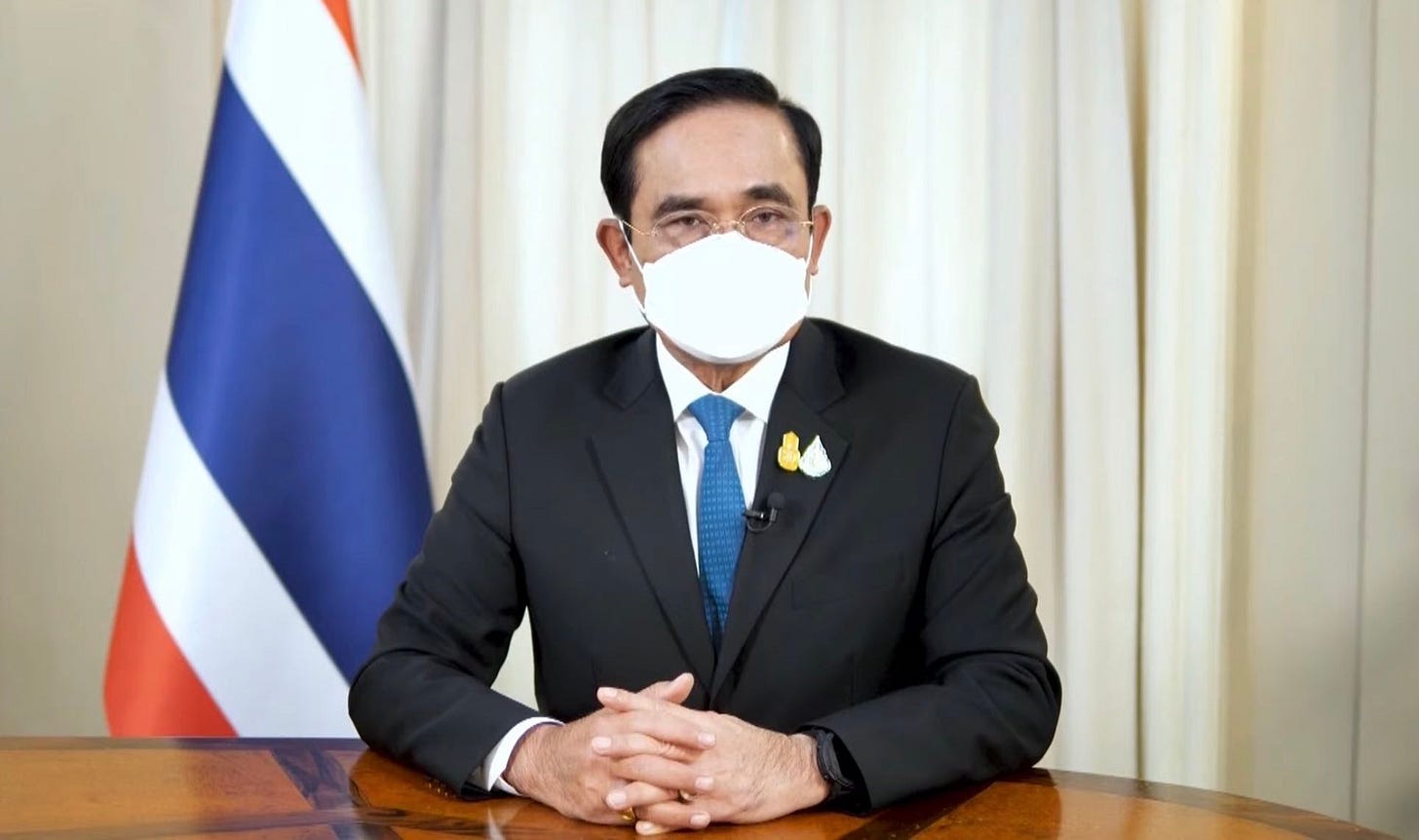
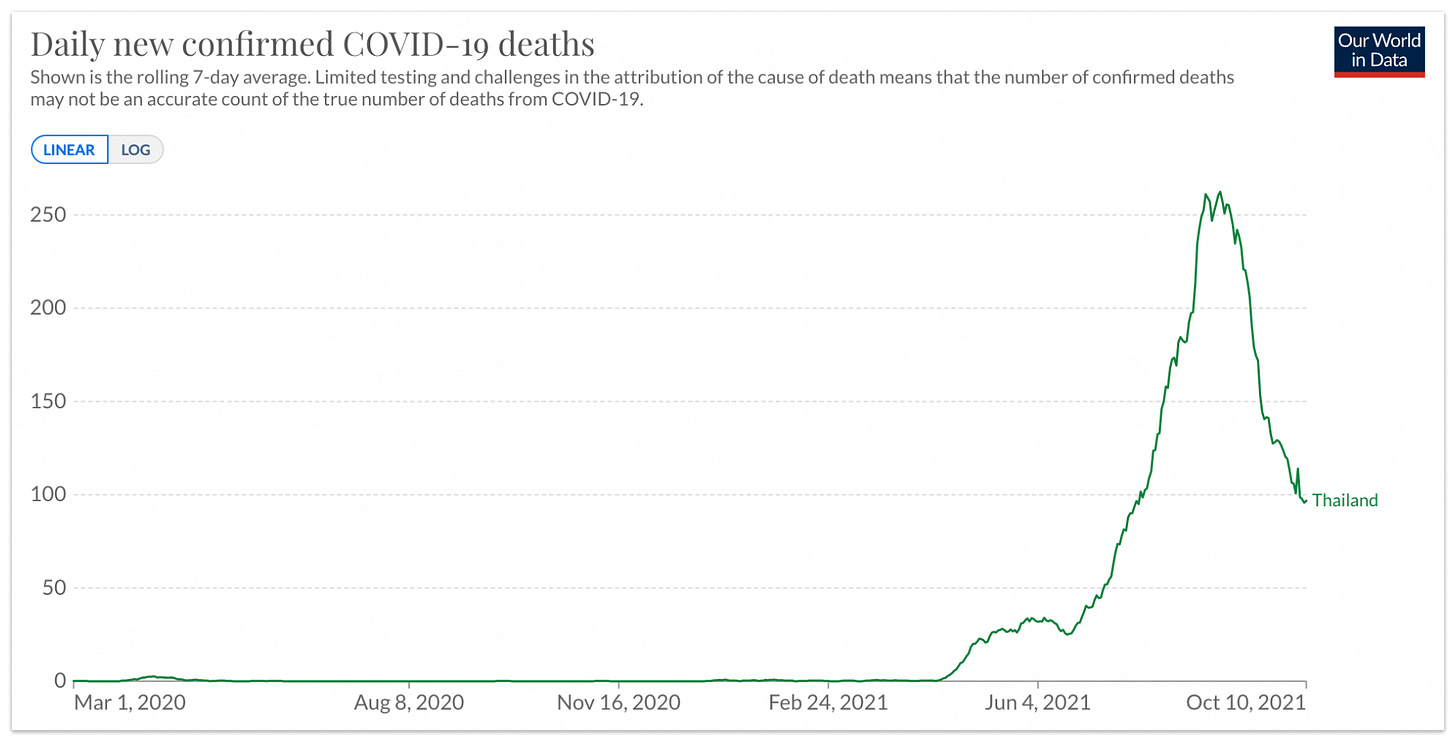


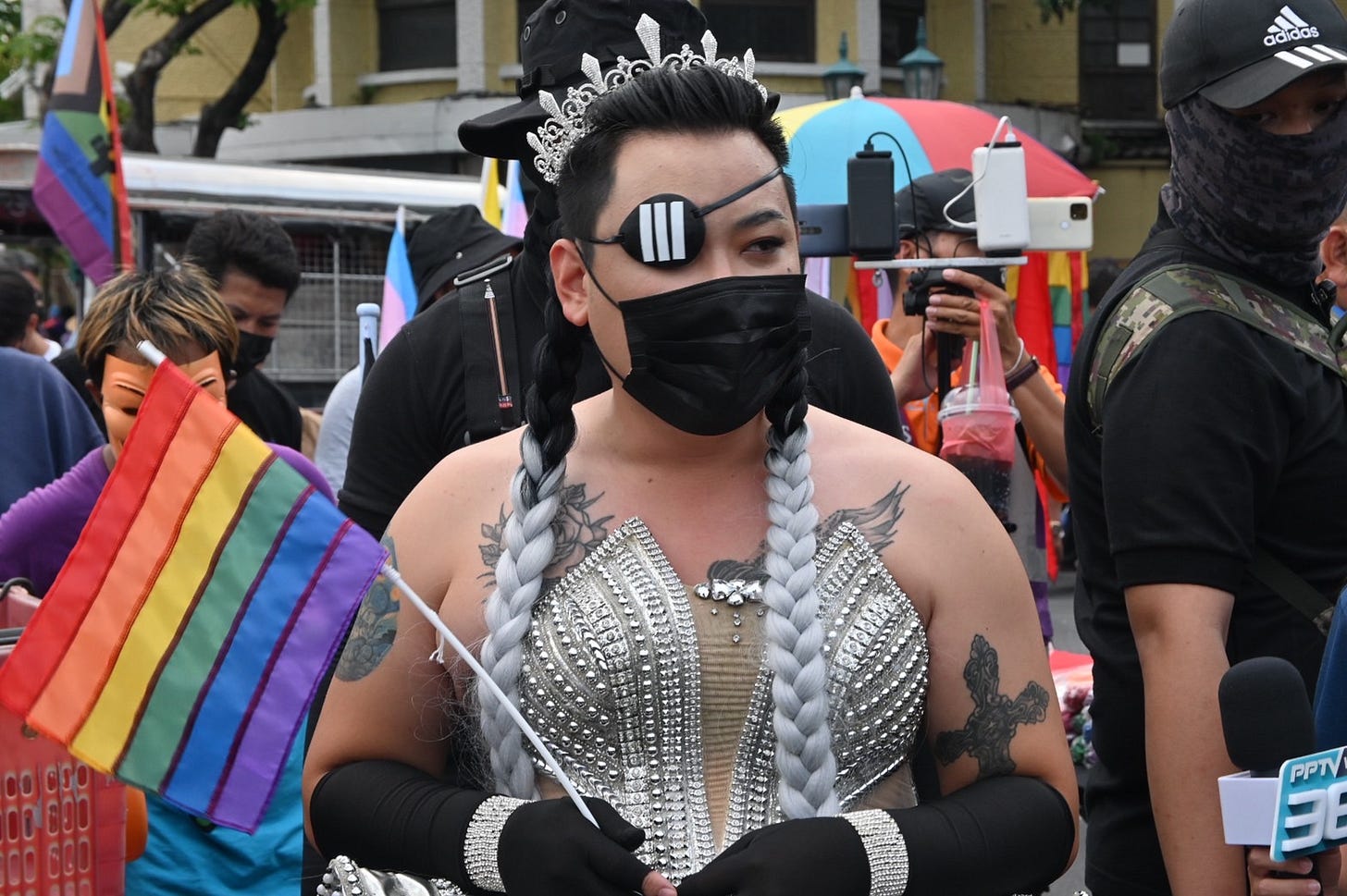
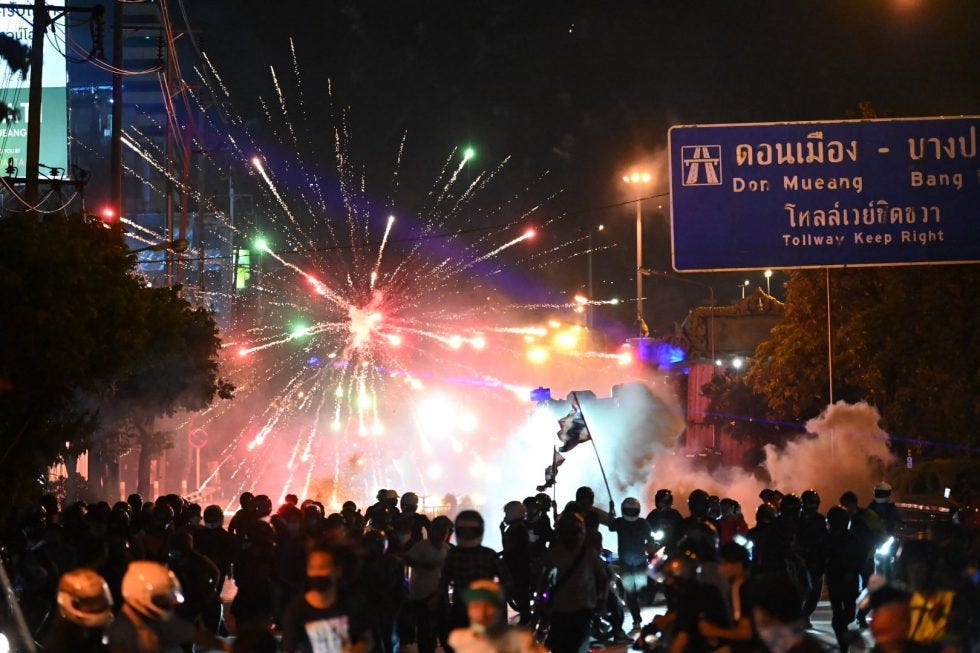
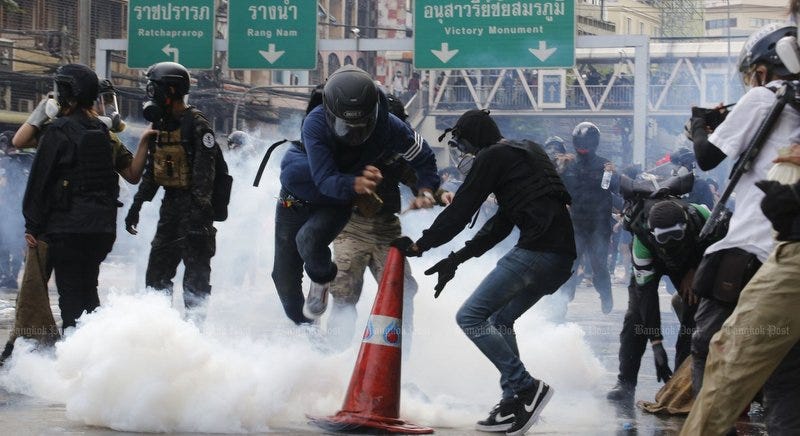


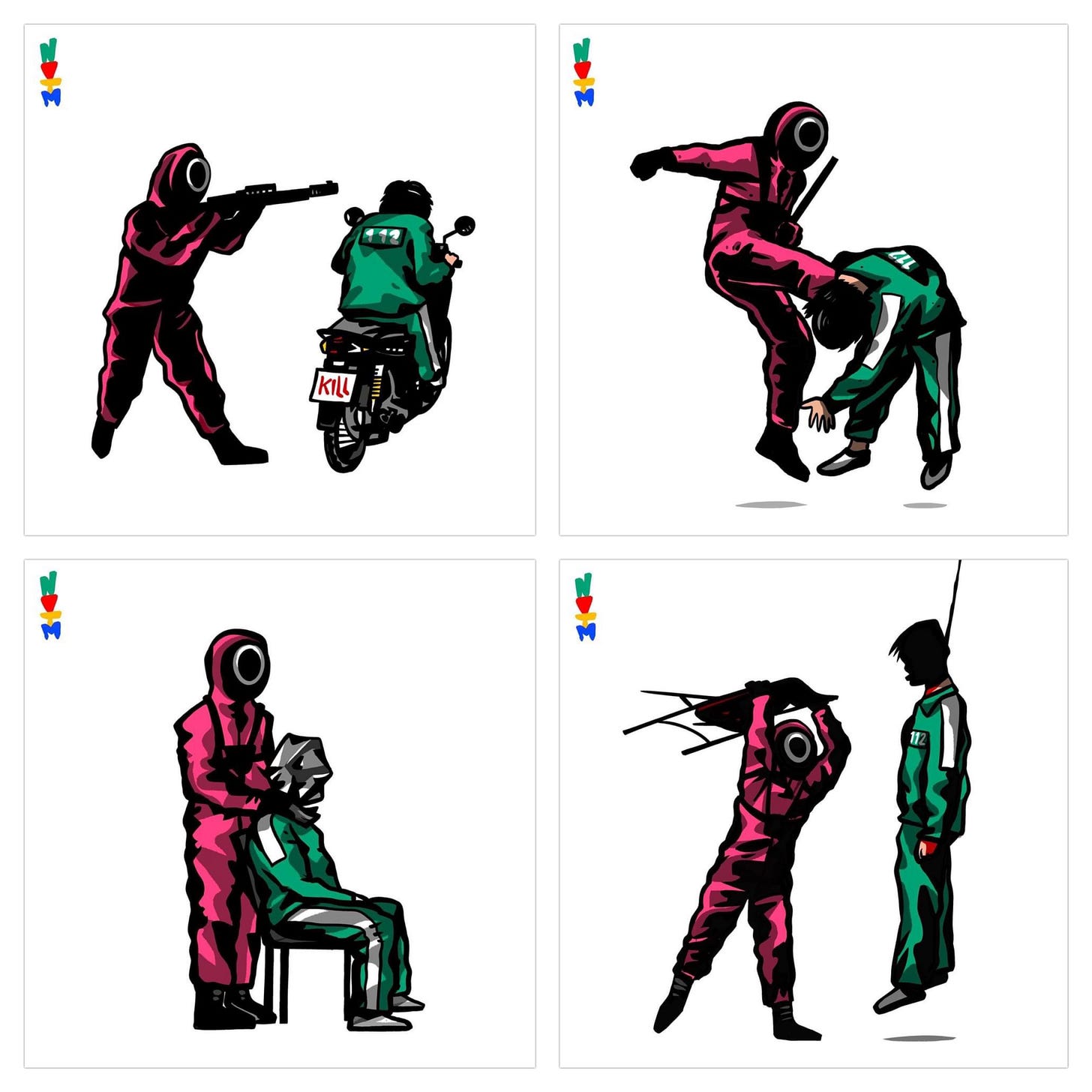
good on Nonthaburi, throwing pla ra at Prayut! (fitting, but what a waste of pla ra! someone's som tam won't be quite as tasty that day) although pla ra is too good for Uncle Tuu...
i hope the Thai people soon will all have had enough of this corrupt, repressive, violent regime and their dark Lord Voldemart; they can't keep throwing 112 at anybody & everybody...
Is there a list of all the people in jail on 112 charges?